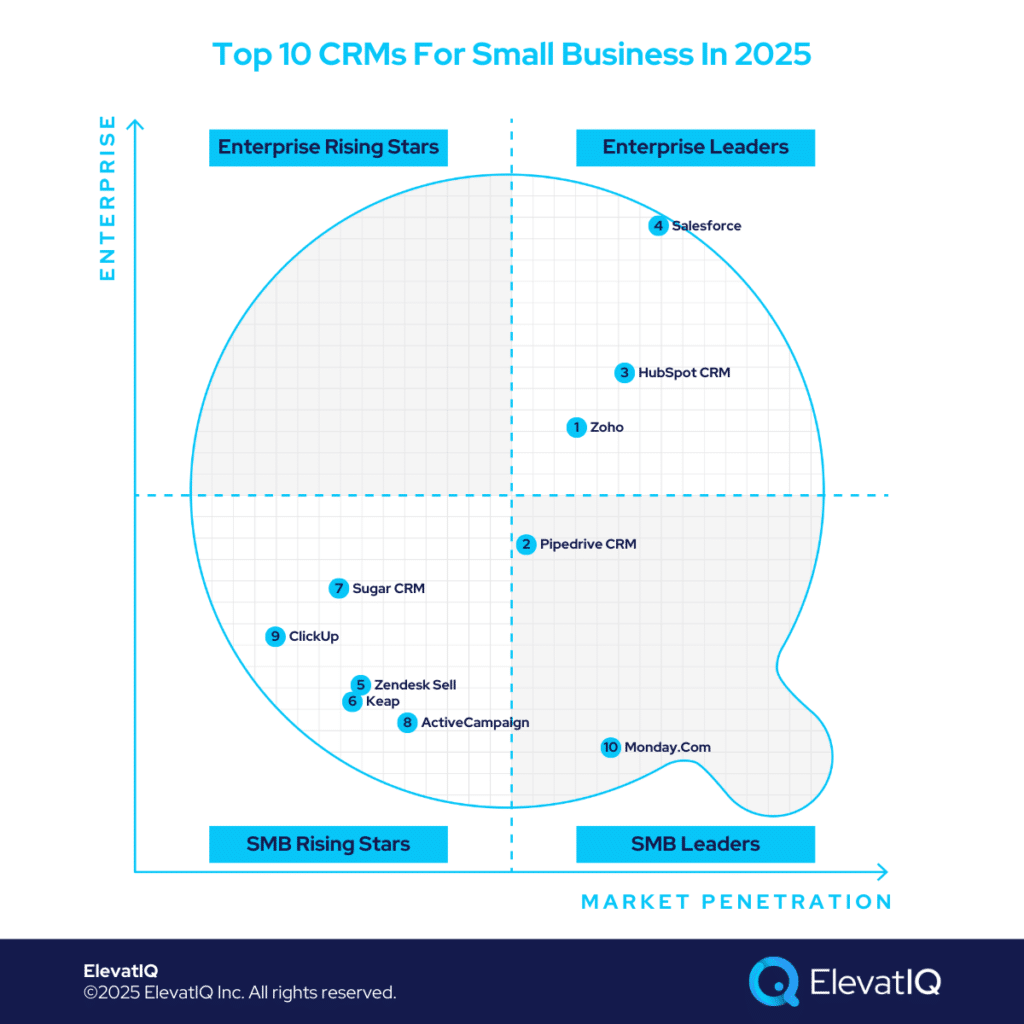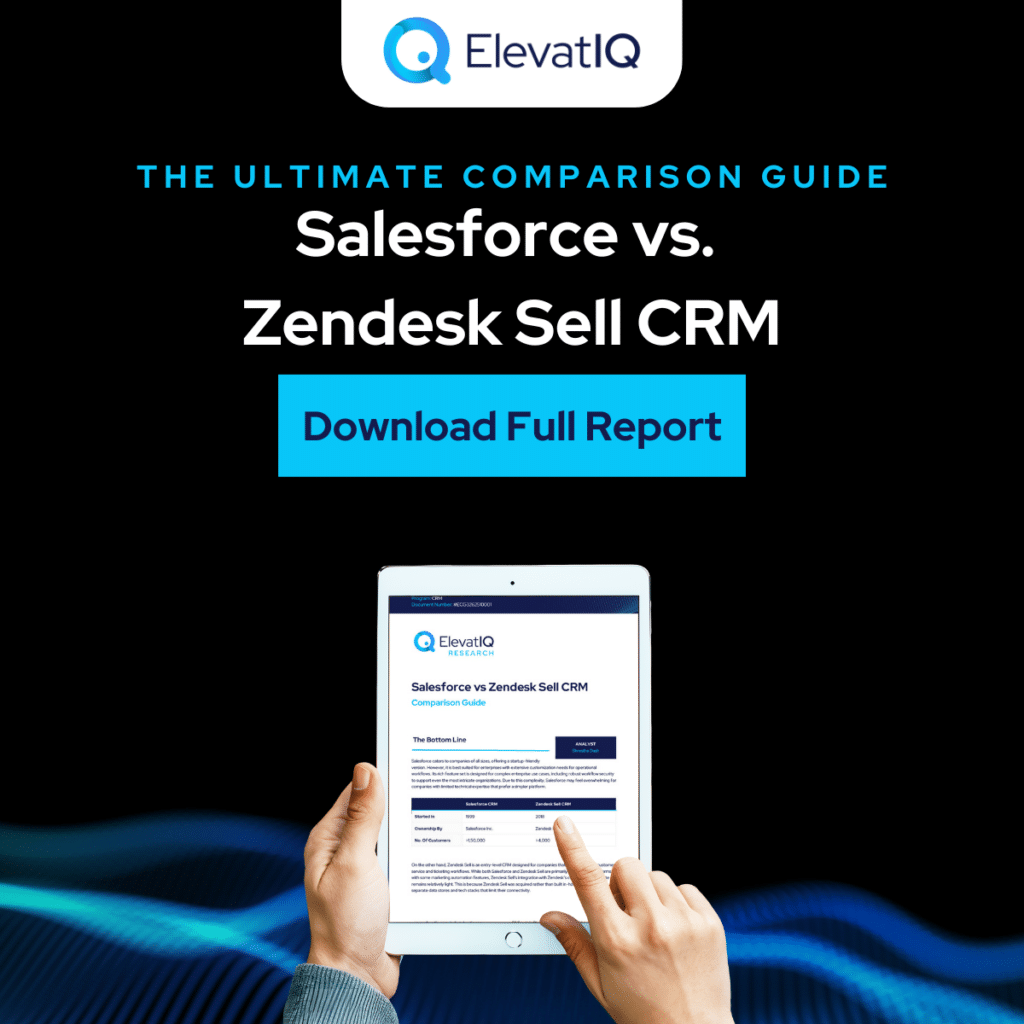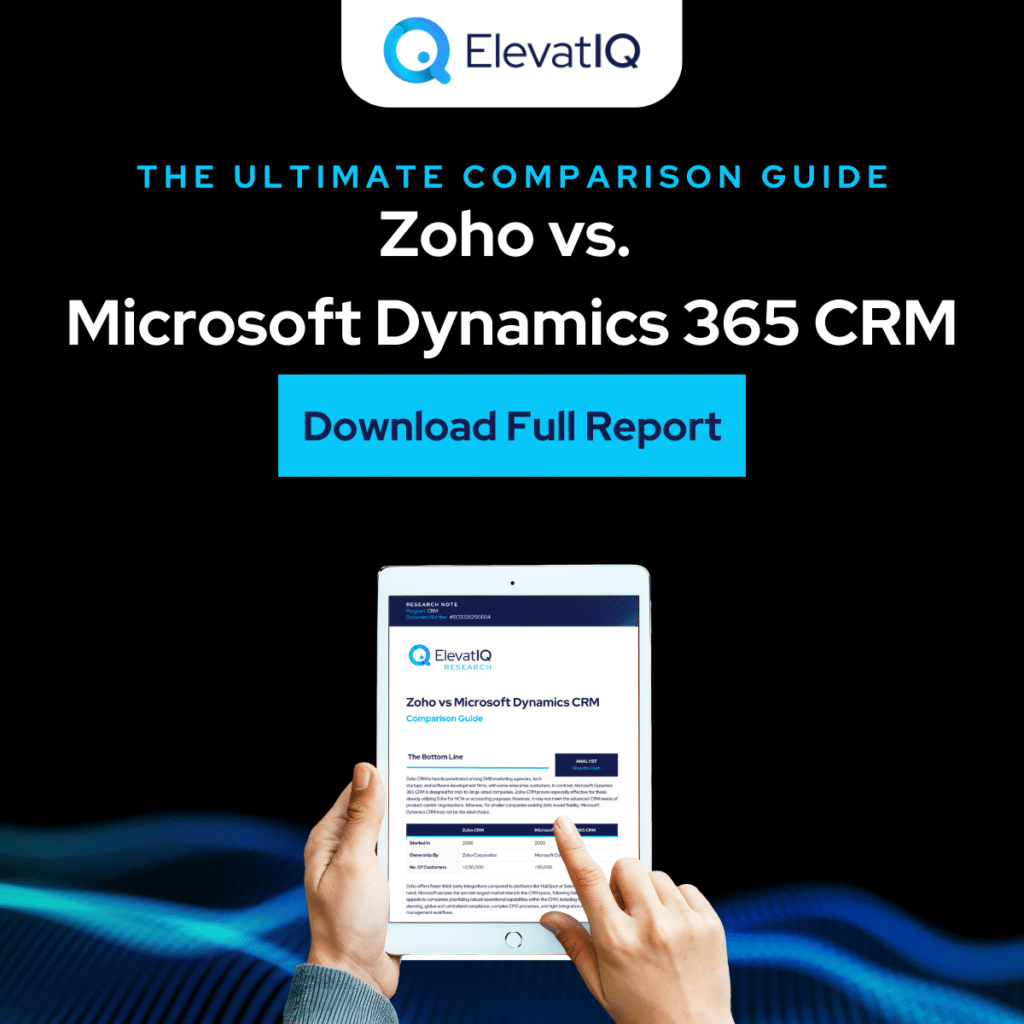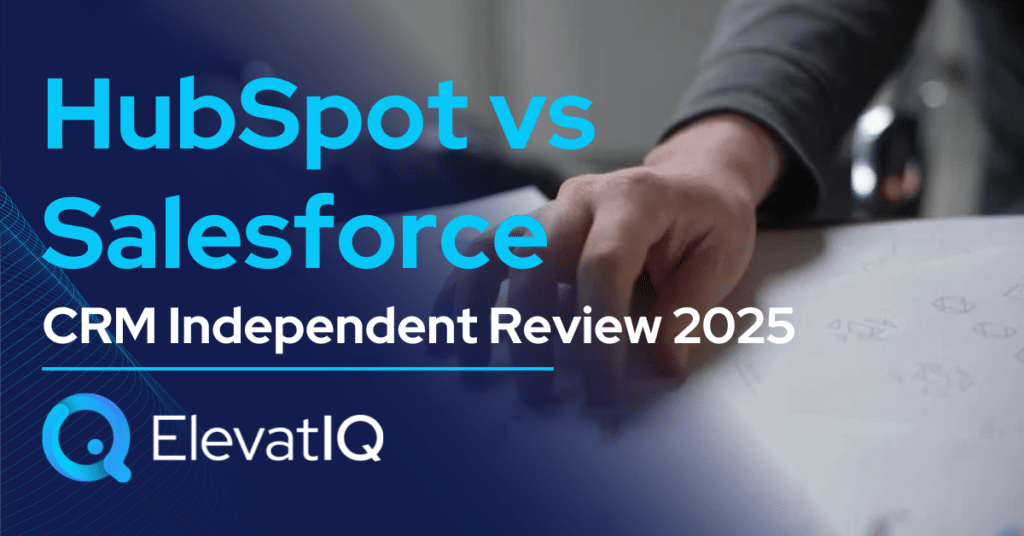Last Updated on April 13, 2025 by Sam Gupta
As smaller businesses outgrow the startup phase, they often need to consolidate data silos. But, with their limited budgets (and somewhat misaligned functions), complete consolidation may be challenging at this stage. Unlike startups, which generally struggle to build a consistent go-to-market strategy due to their limited customer base, smaller businesses commonly have a relatively streamlined approach to the market. However, their current scale doesn’t justify streamlined compensation structures or formally defined sales territories just yet.
CRMs in this segment typically offer somewhat scalable options to support various business models, though customization is often limited by constrained budgets. These systems are generally easier to configure, featuring user-friendly interfaces that simplify customization. However, they may lack advanced customization capabilities, which are seen in larger platforms. Comparing it among different business models, B2B small businesses often require more rigorous traceability for content marketing channels, even if their operational and transactional workflows are less robust. In contrast, B2C small businesses might integrate their CRMs with POS and eCommerce systems but are less likely to have a CDP (or other advanced integrations within their CRM stack).

As for their product design strategy, CRMs for small businesses often include bundled features such as marketing, sales, customer service, and field service (in a single package). Their ecosystems may include other integrated offerings – to offer an optimal experience (across various industries). Common use cases can include integrations with emergency communication platforms, telephony systems, and data providers. While they might support integration with some external systems, more advanced features like auto-routing or ranking are typically absent. Ready to dive into the options uniquely designed for this market segment?

Criteria
- Definition of small organizations. $10-100 mil in revenue or 25-300 employees. Low implementation budget up to $100K. No appetite for integration or custom development. Some systems (and processes could remain siloed). Little to no planning is needed.
- Overall market share/# of customers. Higher market share among small businesses ranks higher on this list.
- Ownership/funding. Refined product roadmaps and management’s clarity with product vision rank higher on our list.
- Quality of development. Modern cloud-native capabilities and unified user experience rank higher on our list.
- Community/Ecosystem. Communities with a heavy presence in the small businesses market segment would drive a higher ranking for the product.
- Depth of native functionality for specific industries. Publisher-owned last-mile capabilities for specific industries, as opposed to relying on add-ons, rank higher on this list.
- Quality of publicly available product documentation. The quality of user and developer documentation drives a higher product ranking.
- Small business market share. Specific market share among small businesses drives a higher ranking on this list.
- Ability to natively support diversified business models. The diversity of the product to accommodate many business models drives higher on this list.
- Acquisition strategy aligned with smaller businesses. Recent acquisitions aligned to the startup market segment drive higher rankings on this list.
- User Reviews. User reviews from the startup market segment drive a higher ranking on this list.
- Must be a CRM product. It can’t be a module of an ERP system. It must be a best-of-breed CRM system, preferably recognized in the CRM category by leading analyst firms.
10. Monday.com
Monday.com is a great option for smaller companies needing a CRM with customizable workflows. Although Monday.com and ClickUp are similarly positioned in the market, monday.com is more project-management-focused and not primarily a CRM, though many companies use it as one. Unlike more restrictive tools, Monday.com offers greater flexibility for customizing processes, though it may require more consulting support. This flexibility is a key difference between ClickUp and Monday.com, yet both hold similar positions in the market and are often used in similar ways by companies. Hence, Monday.com has secured #10 spot on our list of top CRMs for small businesses.
Strengths
- Great capabilities to build simple funnels. Monday.com’s fluid structure very similar to spreadsheets, allows building as many pipelines and funnels as present then in different formats such as swimlanes or spreadsheets.
- Workflows and integration. Monday.com’s cell-level notification and workflow capabilities are especially appealing for building custom integrations and workflows for ad-hoc processes.
- Ecosystem. Monday.com has a sizeable presence of the most popular options companies would require for downstream capabilities.
Weaknesses
- Relational relationships. While Monday.com offers the ability to connect boards and display different perspectives, the overall connectivity between boards may not be as relational as required in industries where customer relationships or business objects are hierarchical. In such cases, more advanced capabilities would be needed. However, for simpler relationship structures, Monday.com is a suitable option.
- Upstream marketing focused integration. Similar to ClickUp, upstream integration options would be limited compared to HubSpot.
- Omnichannel marketing traceability. Omni-channel marketing traceability may be a challenge with Monday.com, a feature that is more robust in tools like HubSpot.

9. ClickUp
ClickUp is primarily a project management, collaboration, and document management tool, but many companies also use it as a CRM due to its versatile platform. One of ClickUp’s strengths is that it offers many capabilities within the same suite, which helps integrate your operational processes. However, its CRM options may be more limited. From a ClickUp perspective, the ecosystem is richer, especially when it comes to operational capabilities within the CRM and other workflows that may be part of your process. Therefore, ClickUp has secured #9 spot on our list of top CRMs for small businesses.
Strengths
- Ecosystem. The ecosystem is much more robust, particularly when considering the CRM’s operational capabilities.
- Integration. ClickUp has a robust ecosystem for integration with several other tools that companies might use, especially for project management and workflow automation capabilities.
- Richer suite with PM, doc management and collab. The project management features are generally more advanced, with strong document management and collaboration tools, particularly for marketing collaboration within ClickUp. This is a major benefit.
Weaknesses
- Not a true CRM player. While some companies may use it as a CRM, it is typically because they don’t have extensive CRM needs. Their needs prioritize operational process integration over pure CRM capabilities, especially upstream features offered by other solutions on this list.
- Upstream marketing integrations. Ecosystem options with upstream marketing might be limited compared to other leading options richer with upstream integrations such as HubSpot.
- Primarily an operational CRM. It could be a great fit as an operational CRM for transactional customer-facing workflows but not a fit for upstream marketing workflows.
8. ActiveCampaign
ActiveCampaign offers strong marketing automation and CRM features, similar to HubSpot, but with fewer advanced capabilities. It’s ideal for budget-conscious companies, although they have increased their pricing recently, which is still lower than other comparable tools such as HubSpot. Positioning themselves for both B2B and B2C, their presence is heavier presence in the B2C verticals. Providing capabilities such as branding guidelines control at the parent entity level (while still allowing branch-level execution), their product is also friendlier for companies with physical retail outlets (as well as organizations with franchise business models). Hence, ActiveCampaign has secured the #8 spot on our list of top CRMs for small businesses.
Strengths
- Ideal for B2C companies with B2B flavors in their business model. Unlike other tools in the market, such as Braze being a pure-play B2C solution and HubSpot not as integrated for B2C verticals, ActiveCampaign enjoys a unique position with the flavors of both for business models that contain both B2B and B2C workflows.
- Ideal for franchise-centric business models. The solution has unique layers for franchise-centric business models. These capabilities would not be present in other generalized solutions.
- Pricing. Although they have increased pricing recently – and removed the limits for unlimited emails, they are still more affordable than similar solutions.
Weaknesses
- CRM data layers are limited for B2B businesses. The data layers would be substantially limited for companies with non-standard sales processes.
- UX is not as modern as other similar solutions. Users report that UX is not as modern as other competing solutions, such as HubSpot.
- Not a good fit for downstream workflow use cases. This is primarily used as a marketing automation tool in conjunction with other CRM solutions such as MS Dynamics 365 CRM and Salesforce.
7. Sugar CRM
SugarCRM is an ideal fit for industrial SMBs that are heavier on downstream operational customer-facing processes. Unlike other CRMs on this list primarily designed with an upstream focus, the detailed transactional layers are especially suitable for companies on manufacturing ERPs. It also has unique subscription-centric capabilities, making it appealing to IT and financial services industries, securing its spot at #7 on our list of the top CRMs for small businesses.
Strengths
- Detailed operational layers. Unlike other CRMs designed primarily for prescriptive use cases, SugarCRM has detailed business object layers and pre-built capabilities for ERP-centric industrial verticals.
- Strong alignment with manufacturing ERPs. SugarCRM has pre-built workflows for manufacturing ERPs such as Epicor, SYSPRO, Plex, and many more. The companies in these industries would require detailed object layers that are generally not available with CRMs designed primarily for upstream marketing workflows.
- Subscription-based capabilities. Unlike other CRM systems that would require an external tool for CPQ and subscription-centric workflows, SugarCRM has that built up natively.
Weaknesses
- Upstream workflows. The upstream workflows and integration would be weaker with SugarCRM, requiring an external marketing automation tool for industries heavier on marketing automation and upstream integrations.
- Ecosystem. While they have come a long way in enabling upstream integrations, the integration ecosystem is not as developed as other mainstream CRM systems such as Salesforce or HubSpot.
- Not as diverse. The industrial workflows and ERP business objects might not be relevant for other industries and business models, making its scope slightly limiting to certain industries.
6. Keap
Keap is primarily designed for the startup segment and offers limited customizability, security, and workflow capabilities. However, for smaller companies with budget constraints, Keap can be an excellent fit due to its affordability and simplicity. Therefore, Keap has secured the #6 spot on our list of top CRMs for small businesses.
Strengths
- HIPAA compliance. Companies in the healthcare sector require their CRMs to be integrated with EHR platforms – along with HIPAA compliance for interoperability between them if CRMs assume the responsibility for communication. Keep has basic capabilities to support HIPAA compliance needs.
- Workflows. Keap includes some built-in workflows, although limited in capabilities compared to HubSpot.
- Building complex funnels. Creating complex funnels is easy within the platform.
Weaknesses
- Limited direct integration with data apps. Integration with various data applications is limited. For instance, when comparing the integration options within ZoomInfo, Apollo, or other tools used for automating marketing and sales funnels, Keap’s pre-built integrations are limited. While there are external tools available to facilitate these integrations, relying on them could increase implementation costs.
- Contact-centric with limited B2B hierarchies. Keap is contact-centric. However, in the small business segment, there is often a greater need for hierarchy and a more comprehensive customer 360 view across various customer segments. If the goal is to link all of these customer records together, Keap may present limitations in this regard
- Limited options with landing page builders, not as rich suite. The landing page capabilities might not be as detailed as other leading options such as HubSpot.
5. Zendesk Sell
Zendesk Sell is similar to Keap, with a relatively limited data model. Its greatest strength lies in its case management and customer service management platform, making it an excellent option for companies focused on post-sales activities rather than marketing. Zendesk is a good fit for smaller businesses seeking a straightforward system on a budget, as it provides essential functionality without extensive complexity. Hence, Zendesk Sell has secured #5 spot on our list of top CRMs for small businesses.
Strengths
- Intuitive interface. Just like Freshsales and Zoho Bigin, Zendesk Sell is a very prescriptive platform designed for smaller companies without complex layers, making the interface intuitive.
- Easy and inexpensive implementation. With a flatter data model and without a complex hierarchy, the platform is relatively easy to implement for companies limited by their consulting budget.
- Advanced CRM capabilities. Compared to other smaller systems that might not have as advanced capabilities, Zendesk has some capabilities that are considered advanced in this market segment.
Weaknesses
- Glitchy. Some users have reported potential glitches. At times, these issues might stem from integrations, depending on their ownership. Additionally, if you’ve customized settings without complete knowledge, certain hiccups may result from that as well. The issue might not necessarily lie with the platform itself.
- Zendesk Sell and Support are not tightly integrated. Overall, while Zendesk owns both the sell and support platforms, they are not as tightly integrated as some of the other platforms on this list, such as those for marketing automation.
- Marketing automation. While Zendesk has great coverage for downstream and operational use cases, the upstream marketing use cases would be weaker compared to other platforms, such as HubSpot.

4. Salesforce
While Salesforce has a truncated version for smaller companies, it’s a completely separate product. Also, the customization layer is not as friendly as with Pipedrive or HubSpot, making it friendlier for smaller companies only in cases where they have prior experience with the platform. Another case could be when they would like Salesforce to be a long-term platform to reduce adoption risks. The biggest disadvantage of Salesforce for smaller companies is its expensive implementation and steep learning curve with the platform for users with limited CRM experience or technical skills, ranking it at #4 on our list of top CRMs for small businesses.
Strengths
- Same interface as the enterprise product. Salesforce has the same user interface for both its essentials and enterprise versions, providing an easier transition for companies as they grow.
- Custom objects. Offering fairly detailed custom objects, it may still struggle with highly complex relationships due to the inherent structure of its CRM data model. If your data model includes very complex interactions or hierarchies, Salesforce might face challenges there as well.
- Report and list builder. Designed to serve different purposes, the report and list builders aren’t as tightly integrated due to the Salesforce data model’s design.
Weaknesses
- Marketing automation not as embedded as other products. Marketing automation is not as embedded or immersive an experience as you would find with HubSpot.
- Integrations are not as intuitive. The integration layer is not as intuitive as with other products, such as HubSpot or Pipedrive, requiring developer support.
- Might need consulting help. Smaller companies with limited implementation budgets might not appreciate the heavy price tag of Salesforce to enable the same capabilities that can be easily enabled with other platforms.

3. HubSpot CRM
HubSpot CRM, compared to Salesforce, has a somewhat simpler data and process model, making it a faster fit for smaller businesses. It may not be ideal for the mid-market segment, but overall, when compared to other solutions like Pipedrive, Zendesk Sell, etc HubSpot offers a more complex data model. However, even HubSpot may fall short in terms of customization for complex use cases. Therefore, HubSpot CRM has secured the #3 spot on our list of top CRMs for small businesses.
Strengths
- One tool to centralize all customer channels. HubSpot offers a single tool to centralize upstream marketing activities but is not as rich for downstream functions like sales operations, sales activities, and sales planning.
- Ecosystem and integration. Pre-integrated options are available primarily for upstream marketing use cases such as ad platforms, telephony vendors, and data providers.
- Comprehensive options to integrate with CMS. Numerous CMS integration options exist along with its native CMS, which has a tighter alignment with its data model.
Weaknesses
- Data model not friendly for complex operational use cases. Data model has limitations, such as limited support for parent-child relationships among their custom objects and their ability to integrate with forms – posing challenges with complex downstream use cases.
- Limited customizability. Because of the data model challenges, HubSpot is not necessarily a good fit for companies requiring highly ad-hoc downstream workflows.
- Might be too difficult and expensive for startups despite the initial free option. The pricing can become quite steep with advanced options. This makes HubSpot’s pricing a bit tricky to estimate, as it can be challenging to predict what you’ll ultimately pay.
2. Pipedrive CRM
Pipedrive CRM is an ideal fit for smaller companies seeking a prescriptive platform stronger in downstream marketing workflows. It would work for companies that care for an integrated CPQ and document-driven workflows for B2B companies. While it might not have the same level of customizability as HubSpot, it’s a platform for companies with limited technical skills and implementation budget, securing its rank at #2 on our list of top CRMs for small businesses.
Strengths
- Workflow automation. While the platform is relatively smaller, it has basic workflow capabilities similar to HubSpot for autonomous workflows( between different business objects and external systems).
- Similar look-and-feel as HubSpot. The look and feel will be very similar to that of HubSpot, a big advantage for users familiar with HubSpot. Pipedrive is also slightly more affordable than HubSpot.
- Easy customization of reports and goal setting. Compared to smaller platforms such as MailChimp, the reports are fairly built, as well as some functionality for goal setting if that might be a critical success factor for you.
Weaknesses
- Weak data structure for complex B2B startups. The main limitation of Pipedrive is its relatively weak data structure from a B2B startup perspective, especially if there are complex relational connections and need to consolidate interactions (and related data) for those relationships.
- Limited data import and export functionality. The import and export functionality is also fairly limited, which smaller companies are likely to need. For this reason, Pipedrive may not be the best fit in such cases.
- Limited customizability. While the platform has some customization capabilities, the custom objects are not as detailed and don’t have the same capabilities, limiting it to complex use cases outside of its pre-built workflows.
1. Zoho
Zoho is an excellent choice for smaller companies seeking a comprehensive suite with strong operational features. However, it might not be as rich with upstream marketing capabilities, limiting seamless integration with best-of-breed tools, especially third-party. This is because Zoho’s approach emphasizes promoting its own tools. Hence, Zoho secures the #1 spot on our list of top CRMs for small businesses.
Strengths
- Data model similar to Salesforce for building complex workflows. The data model is quite similar to Salesforce, making it well-suited for building complex use cases, particularly in service-centric sectors like non-profit, public sector, or education.
- Complete stack. Whether it is CPQ processes or customer relationships, the hierarchies involved are significantly more complex. This is where Zoho truly fits, providing a complete, integrated stack.
- Integration with other Zoho apps. There will be integration with other Zoho apps, providing more connections with the processes. While it may not offer the same deeply embedded experience
Weaknesses
- Not as integrated in the upstream ecosystem. The integration options are limited for upstream marketing use cases, primarily limited to the apps present in Zoho’s ecosystem. Integrating with other apps would require custom integration and development help.
- Not as open ecosystem as HubSpot. It’s a slightly more closed ecosystem compared to HubSpot, as they prioritize protecting their own revenue, preferring to integrate primarily with their own solutions and apps.
- Might require consulting help for implementation. It might require consulting help, just because of the complexity of its data model as well as process model.

Conclusion
As small businesses navigate their journey beyond the startup phase, choosing the right CRM can be a game-changer. The best CRMs for small businesses offer solutions tailored to limited budgets and evolving needs, balancing scalability with ease of use. From streamlining customer interactions to integrating essential tools like eCommerce platforms and marketing automation, these systems are designed to support diverse business models, whether B2B, B2C, or hybrid.
While options like Zoho stand out for their comprehensive suite and robust capabilities, platforms like HubSpot and Pipedrive offer user-friendly interfaces and strong marketing integrations. Each solution brings unique strengths—whether it’s affordability, industry-specific features, or seamless integration—ensuring there’s a CRM to match every small business’s goals. However, limitations like constrained customizability or weaker upstream marketing capabilities underscore the importance of aligning your choice with your specific priorities. While this list offers valuable insights, seeking advice from an independent CRM consultant can greatly enhance the implementation success.









